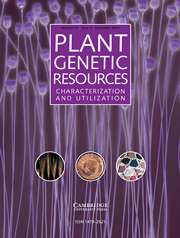Article contents
Insights into the genetic diversity of Indian cardamom [Elettaria cardamomum (L.) Maton]: for a future research perspective
Published online by Cambridge University Press: 17 July 2023
Abstract
One of the most essential prerequisites in plant breeding is to have a maximum collection of germplasm materials with all sorts of variability. As a part of the programme under the All India Coordinated Research Projects on Spices, totally 196 germplasm accessions of small cardamom are being maintained as field gene bank repository at the Cardamom Research Station, Pampadumpara. Tropical evergreen forests of the Indian Western Ghats and Sri Lankan Central Highlands are recognized as the home of cardamom. The area and production of cardamom are maximum in Kerala followed by Karnataka and Tamil Nadu. Variations among the germplasm collections in morphological and biometrical characters as well as for yield have been studied and reported in this paper. Accessions with distinct morphological marker characters, such as compound panicle types, terminal panicle bearing, narrow leaf types, pink pseudostem types, dark green bold capsules with high-yield potential and biotic-stress tolerant types, are being evaluated and conserved in this repository. The assessment of genetic diversity is an essential prerequisite for undertaking crop breeding activities to evolve suitable area and region-specific variety. Sixty-seven cardamom accessions were studied for genetic diversity by evaluating 14 unique characters for 3 years (2016–2018). Almost all accessions have shown significant variability for most of the biometric and biotic stress characters. Results have indicated a greater magnitude of genetic diversity of small cardamom present among accessions representing whole evergreen tropical forest of the Western Ghats.
- Type
- Research Article
- Information
- Copyright
- Copyright © The Author(s), 2023. Published by Cambridge University Press on behalf of National Institute of Agricultural Botany
References
- 1
- Cited by


